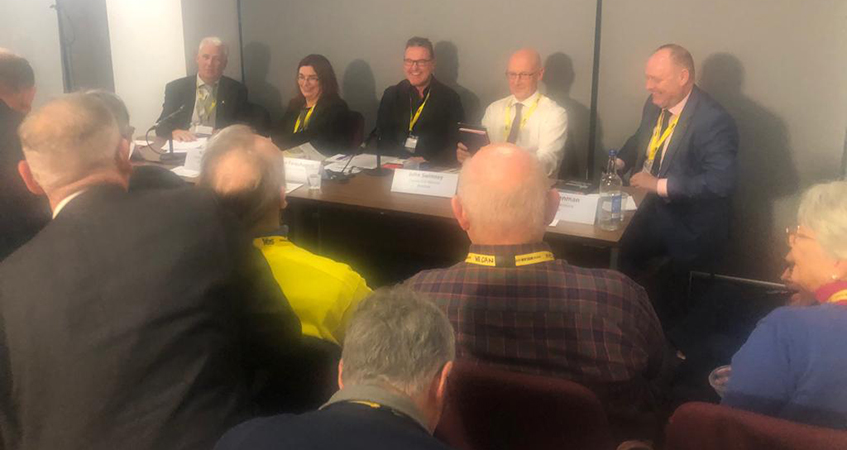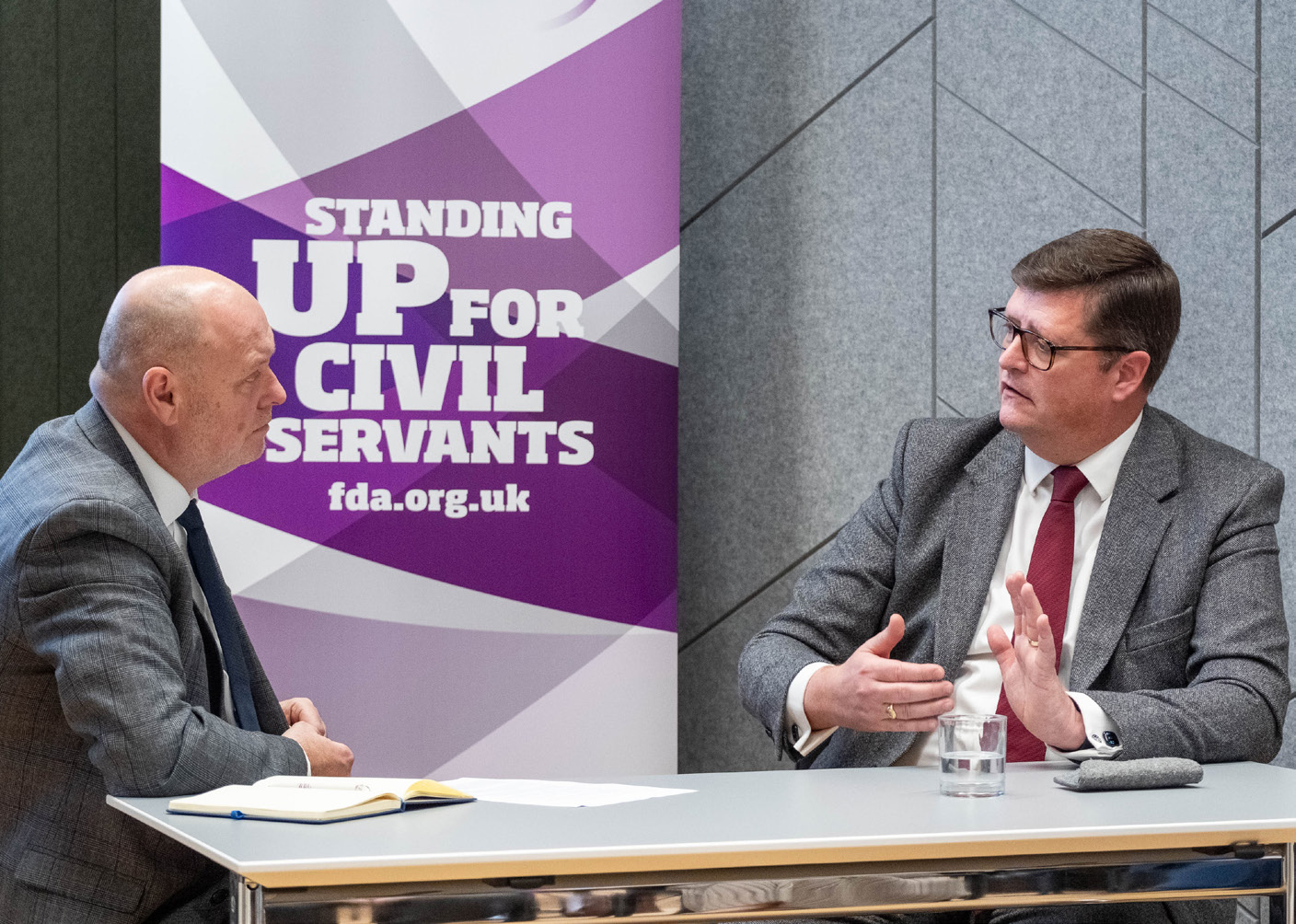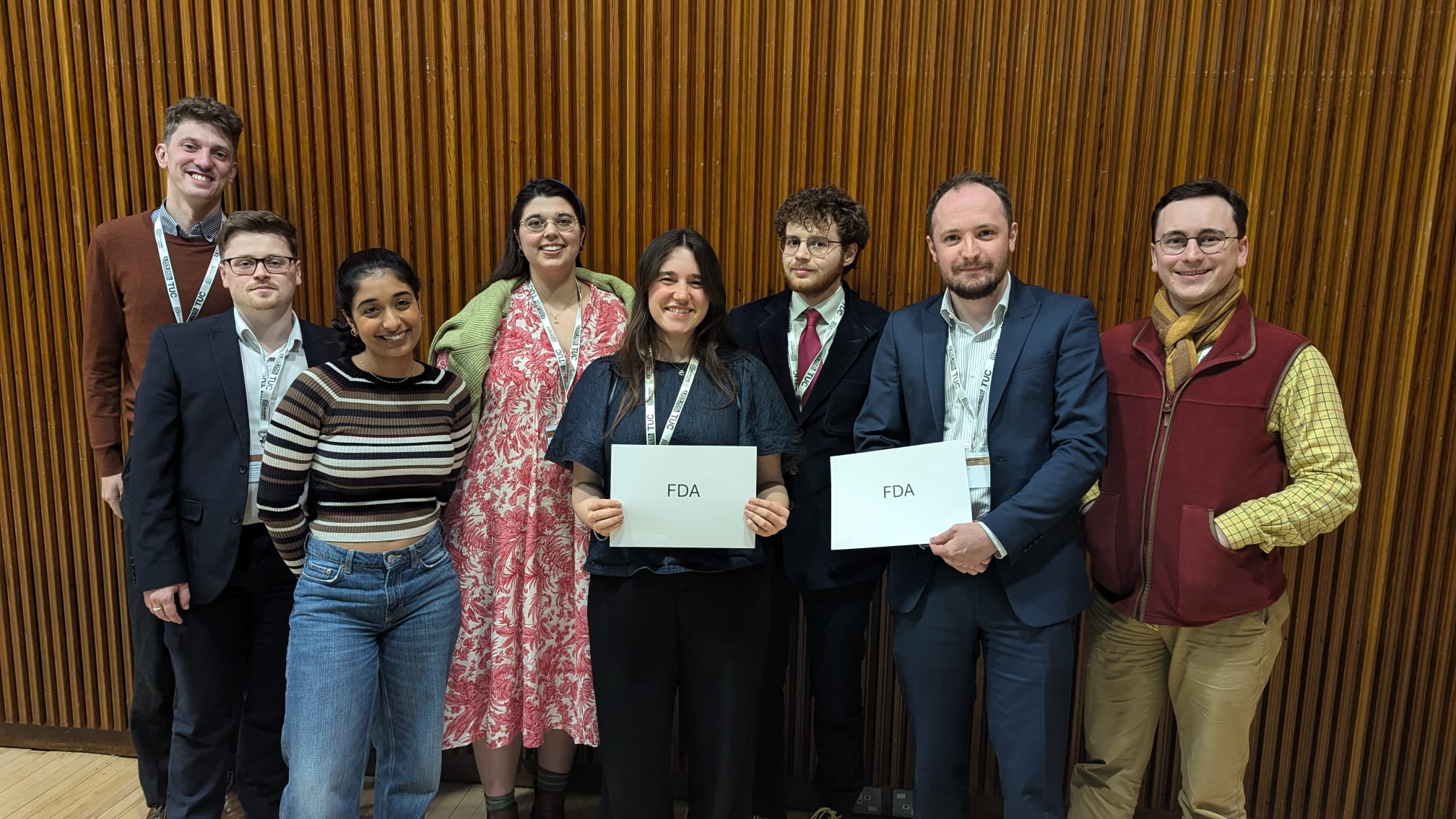FDA to SNP: One civil service can serve two governments

This week, FDA General Secretary journeyed to Aberdeen to answer a simple question: can the SNP trust the senior civil service?
Penman, joined by Smith Institute Deputy Director Steve Barwick, has spent this party conference season touring the country and delivering fringe events on the subject of civil service impartiality. On Monday 14 October, the pair arrived in Aberdeen to take part in their fourth and final panel. They had already addressed audiences at the Lib Dems, Conservatives and Labour conferences. Now they were to speak to SNP members.
Joined by Deputy First Minister John Swinney and Territorial Politics Professor Nicola McEwen, Penman and Barwick spoke in a panel chaired by The Times Scotland columnist Kenny Farquharson.
Barwick was the first to speak, telling the room about the Smith Institute report ‘Impartiality Matters’, which he edited. He explained how senior politicians from across the political spectrum contributed to the collection of essays, and described the feeling he had when he saw an email from Nicola Sturgeon about the project in his inbox. This, he argued, spoke volumes about how important she felt the subject was.
He reiterated his previous claim that in the current political climate civil servants can be “too often and too quickly” condemned and turned into a “political football”. Impartial advice, he continued, is more needed than ever in this post-truth era. However, he argued, we must not only defend the principle of impartiality, but think about how it needs to evolve so that it remains fit for purpose.
Farquharson asked Penman how civil servants dealt with politicians “for whom the evidence doesn’t matter”, and who “pursue their politics on a post-truth agenda”. The General Secretary explained that the civil service is there to serve the government, or governments, and that ultimately civil servants advise but ministers decide on a course of action. “Once the minister makes a decision, the job of the civil servant is to go off and implement” it.
“You don’t become a civil servant if you’re not prepared to serve the government of the day,” Penman continued, noting that these individuals may have to work on policies they personally find “abhorrent”, “objectionable” or “bizarre”. He admitted that this could be difficult for people outside of the civil service to get their heads around, with certain political commentators recently saying that Permanent Secretaries should rise against the government over the issue of Brexit.
“We have members both in Edinburgh and in London facing death threats,” Penman explained, “because of the positions they hold and the action they are duty-bound to take”. People project bias onto these civil servants’ actions, viewing them as having a political motivation where none exists.
“It’s a duty on everyone,” the General Secretary said, “including those in government, to defend the impartiality and the integrity of the civil service. That is why we’re here”.
McEwen then provided historical context about the creation of a devolved Scottish government, explaining how there was debate about whether there should be a “separate Scottish civil service”. Though she believed there was less exchange between civil servants in Scotland and Whitehall than there used to be – which she said “is not a good thing” – she also stated that the SNP can trust the civil service “without question”.
Swinney showed similar faith, giving an “unequivocal yes” when asked if his party could trust the senior civil service. He told the room that as a politics student, reading about civil service impartiality, he always had “a wee kind of doubt in my mind” that the principle could actually hold true. However, he has since experienced this integrity first hand. He spoke about meeting Sir John Elvidge – the Permanent Secretary of the then Scottish Executive – the day after the SNP took power of the Scottish Government. Sir John shook Swinney’s hand, and congratulated him on his election win. Within five minutes, they were sitting down discussing the formation of a new administration. The following Monday, Swinney was sat in St Andrew’s House with a civil servant – appointed by Sir John – going through practical operational details. “Up until Thursday night, that civil servant was duty-bound to work for the Labour-Liberal Executive that was in office,” he explained. The principle of impartiality had been maintained, and allowed him to shift focus and serve the new government of the day.
Though there is one unified home civil service, the Deputy First Minister noted that civil servants work for the ministers of the administration they are serving. So one based in the Scottish Government advising him follows “the political direction of which I’m a part”, while another working in Edinburgh for the Secretary of State for Scotland will be focusing on a different direction.
“Fundamentally,” Swinney stated, “I feel outstandingly well-served by civil servants in all my twelve years as a government minister.”
Asked if he ever felt he was “grappling with the machinery of the British state” while trying to do what he wanted to do as a minister, Swinney answered with a resolute “no”. “In 1997,” he continued, “when the Labour government came in, I think there was a mentality at the time that ‘this lot [civil servants] have been working for the Tories, and we can’t trust them’”. The Deputy First Minister believed that they wasted a lot of time and energy worrying about that point, whereas he didn’t want to spend a minute second-guessing why Sir John Elvidge shook his hand.
Farquharson then asked what an independent Scotland would mean for the civil service – what would be lost, and what gained. “I don’t think we would lose anything,” Swinney replied, “or gain anything either. What you would have is what we have got just now, which is civil servants operating to our policy agenda.”
Later, following a question from the audience, the panel discussed a letter written during the Scottish independence referendum by then Permanent Secretary to the Treasury Sir Nicholas Macpherson. This document warned against a currency union between a newly independent Scotland and the UK, and was published by the coalition government. The question was framed to suggest that the civil servant acted partiality, but Swinney insisted that the letter was “appropriate”, as Sir Nicholas was perfectly entitled to provide that advice to the Chancellor.
“What I think was inappropriate,” he said, “was the publication of that letter by the Chancellor” at the time. This put the civil servant in question in the spotlight, when Swinney thought that George Osborne should have been making his case and stating his views himself.
Penman agreed with the Deputy First Minister. “I think Osborne decided to publish that because it added weight to his argument,” he said, describing the action as “indefensible”.
Discussions from the FDA’s fringe event were reported by The National.
Interested in the debates from the other party conferences? Read the reports from the Liberal Democrat, Labour and Conservative fringe events.
Related News
-

Changing the culture
HM Chief Inspector Sir Martyn Oliver sat down for an ‘in conversation’ event with FDA General Secretary Dave Penman, discussing the pace of change in Ofsted, challenging perceptions and tackling the long hours culture in Education.
-

FDA attends TUC Young Workers’ 2025
This March, an FDA delegation attended the annual TUC Young Workers’ Conference in Congress House, London.
-

FDA celebrates Women’s History Month 2025 with panel event
To celebrate Women’s History Month and International Women’s Day 2025 the FDA hosted a panel event looking at the history of women in the civil service and within the trade union movement.